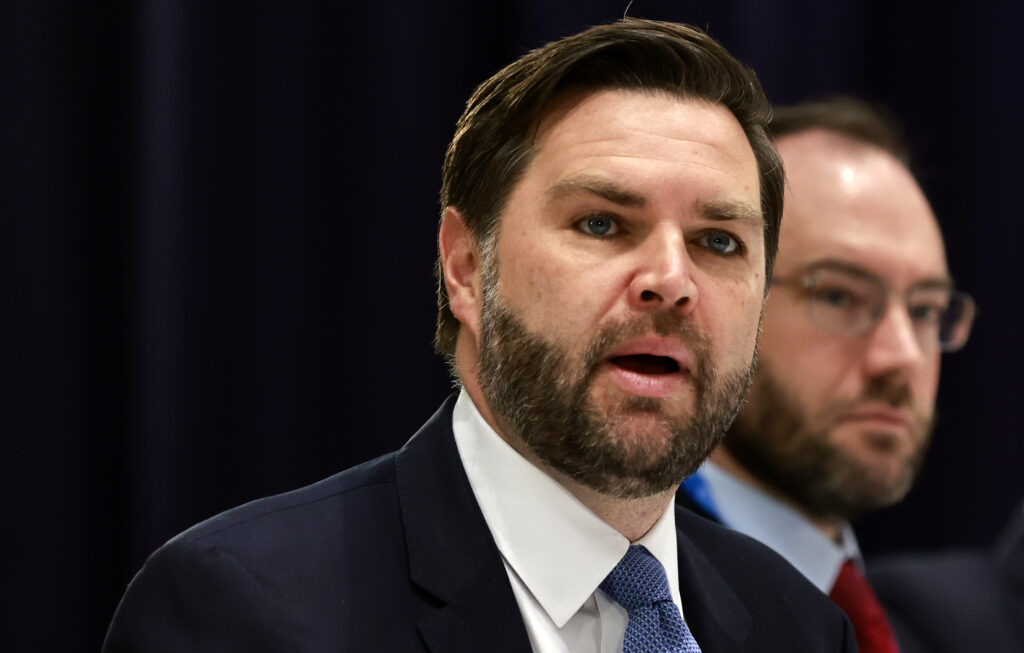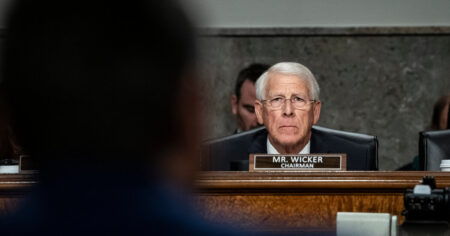U.S. and Russian officials are meeting in Saudi Arabia this week to discuss an end to hostilities in Ukraine, without Kyiv representatives present, as questions have been raised over the U.S. vice president’s comments regarding the negotiations.
Secretary of State Marco Rubio sat with Russian Foreign Minister Sergei Lavrov at the Diriyah Palace in Riyadh, signaling a potential thaw in Kremlin-Washington relations after years of tension following Moscow’s 2022 invasion of Ukraine.
President Donald Trump’s administration has stirred tensions in Europe and led a somewhat unorganized approach to peace talks, with Defense Secretary Pete Hegseth walking back comments he made about the war to a Ukraine committee in Brussels.
Speaking to reporters, Trump has denied that his Vice President JD Vance had suggested that U.S. military action was available as “leverage” in negotiations with Russia.
The Claim
Speaking to reporters in West Palm Beach, Florida, on February 16, 2025, Trump was asked: “Vice President Vance said that the United States would potentially take military action against Russia if they won’t come to an agreement—do you agree with that stance?”
Trump replied: “I don’t know if that’s what he said. I don’t think he said that.”
The Facts
In an interview with The Wall Street Journal published on February 14, Vance was asked about security guarantees the U.S. could provide Ukraine as part of a peace settlement with Russia, and what “instruments of pressure” could ensure Moscow’s cooperation.
In his response, Vance mentioned “military tools of leverage” among a “range of options.”
“I think certainly, look, there, there are instruments of pressure, absolutely. And again, if you look at President Trump’s approach to this, he—the range of options is extremely broad,” Vance said.
“And there are economic tools of leverage, there are, of course, military tools of leverage. There’s a whole host of things that we could do. But fundamentally, I think, the president wants to have a productive negotiation, both with Putin and with Zelensky.”
Later, Vance responded to a question about Defense Secretary Pete Hegseth’s comments at the Ukraine Defense Contact Group on February 12, 2025, to whom Hegseth said, “Any security guarantee” to Ukraine would not include U.S. troops in Ukraine.
Vance was asked if it was a “fair critique” that publicly dismissing options like deployment lessened U.S. negotiation leverage.
Although not explicit, Vance replied that Trump could refresh options if Russia or Ukraine weren’t “good negotiating partners.”
Vance said: “Now in terms of taking things off the table or reducing leverage, I just don’t think that’s the right way to think about President Trump’s role in any—or President Trump’s position in any negotiation because President Trump could, could say, ‘Look, we don’t want this thing, we might not like this thing, but we’re willing to put it back on the table if the Russians aren’t being good negotiating partners, or there are things that are very important to Ukrainians that we might want to take off the table.’
“He might put them back on the table if he doesn’t think the Ukrainians aren’t being good negotiating partners.”
Vance later said a deal could include “things that we assumed were not on the table actually are on the table, and where the Ukrainians, the Russians, the Americans, and the Europeans are fundamentally happy with where it lands.
“And I think the reason it will land in that place is because the president is not going to go in this with blinders on,” Vance added.
“He’s going to say, ‘Everything is on the table, let’s make a deal.'”
While Vance did not reply directly to a follow-up question about whether U.S. deployment had been ruled out, he said, “I also think the president is very clear that whenever he walks into negotiation, everything is on the table.”
The vice president has since attacked the Journal, saying it “twisted” his words. A full transcript of the interview is available via the Journal‘s website.
In a post on X, formerly Twitter, on February 14, 2025, Vance said: “President Trump is the ultimate deal maker and will bring peace to the region by ending the war in Ukraine.
“As we’ve always said, American troops should never be put into harm’s way where it doesn’t advance American interests and security. This war is between Russia and Ukraine.
“The fact that the WSJ twisted my words in the way they did for this story is absurd, but not surprising considering they have spent years pushing for more American sons and daughters in uniform to be unnecessarily deployed overseas.”
Newsweek has contacted a representative for the White House and The Wall Street Journal via email for comment.
Vance did not explain what “military tools of leverage” he meant and his soft answer about U.S. negotiating chips may not indicate a robustly aggressive stance toward Russia. However, a summary of his comments, that the U.S. could “potentially” take military action against Moscow is fair.
The Ruling
True.
JD Vance did say that “military tools of leverage” could be used if Moscow did not cooperate with the terms of a negotiation that ended fighting between Russia and Ukraine. He did rule out U.S. deployment, saying “the president is very clear that whenever he walks into negotiation, everything is on the table.”
While Vance claimed his words were “twisted,” a full transcript shows he did not rule out military action.
FACT CHECK BY Newsweek‘s Fact Check team
Read the full article here

















